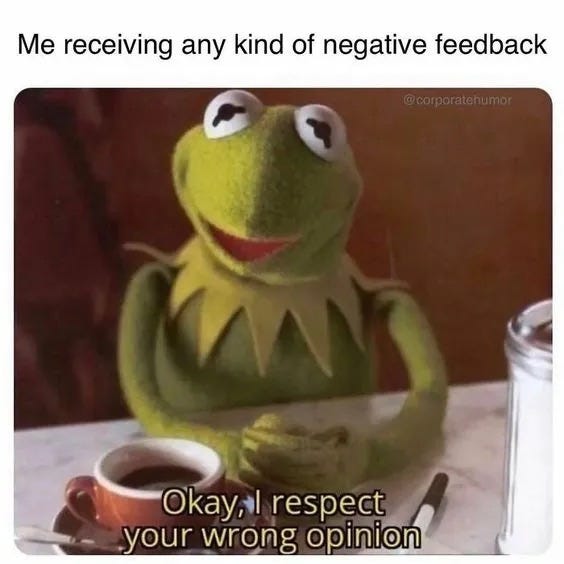11 ways to get better feedback from your manager
Hard truths about why your manager isn’t giving you more feedback--and what to do about it.
👋 Hey, it’s Wes. Welcome to my weekly newsletter where I share frameworks for becoming a sharper operator, rooted in my experience as an a16z-backed founder.
Apply to work with me for 1:1 executive coaching or bring me on for a keynote to speak with your team about managing up, giving/receiving feedback, and standing out as a high-performer. Fill out this form to learn more.
In this week’s newsletter, we’ll cover how to get more and better feedback from your manager:
Make it insanely easy for your manager to give you feedback.
“Feedback” might feel loaded. Ask what to do differently and what worked well.
Give them permission to rip your work apart.
Don’t romanticize feedback. You might already be getting it.
Give your manager something concrete to react to.
Don’t expect your manager to create a structured lesson plan for you.
React positively when you get feedback.
Frame why giving you feedback is ROI positive. It’s not always obvious or true.
Specify what part you need help with.
Be explicit about the type of feedback you’re looking for.
Be the kind of operator managers want to invest in.
Read time: 8 minutes
When people don’t get enough feedback from their manager, they often think, “My manager must be too busy.”
This might be the case. But before you jump to that conclusion, consider that there’s more within your control than you think: Did you make it easy for your manager to help you? Did you ask a vague question? Do you behave like someone who your manager would want to invest in?
These are all factors within your control. When you take these into account, you could dramatically change how much feedback you’re able to get.
If you have a manager who has high standards, here’s how to get more and better feedback from them.
1. Make it insanely easy for your manager to give you feedback.
If you only say “I’d love to get your feedback,” your manager might not know where to start. If you ask more specific prompts, it gives them more to react to.
One of my direct reports sent this Slack DM and it's a masterclass in simple, direct communication:
No guessing where to find docs. No follow-up questions on timing. No confusion about priority levels.
She made it easy--and in less than 1 hour, I was able to provide feedback, give approval, and remove myself as the bottleneck for her projects.
Make it easy for people to give you what you want. Every bit of friction prolongs the time you’ll have to wait for your manager to reply.
2. “Feedback” might feel loaded. Ask what to do differently and what worked well.
If you suspect your manager may dread or procrastinate on giving feedback, you can avoid calling it feedback altogether.
Whenever you send work output for your manager to review, this is a good time to ask for their input. You can say:
“What would you do differently? What’s missing?”
“What grade would you give this? What would make this an A+ in your eyes?”
“What is the most interesting 20% of this? Most boring 20%?”
“Could you mark which parts of this memo are confusing?”
“What would you do if you were in this situation?”
“Do you see any risks or logical gaps that I missed?”
Notice how these questions are designed to draw out insights from your manager.
A few readers have mentioned that instead of using the term “feedback,” you can ask for advice, guidance, thoughts, input, etc. I have mixed feelings on this.
On the one hand, you can use most of the terms interchangeably—I like input, initial reaction, and thoughts as neutral terms. On the other hand, there’s subtext implied in some of those terms too.
Namely, I think there is a difference between advice vs feedback.
Advice implies a relationship where you may or may not take my advice. It feels a bit more distanced. The power dynamic is one where perhaps I’m a mentor outside your organization. Or I’m giving you advice on an issue where I’m agnostic either way on what you decide to do.
Feedback implies a dynamic where I (the feedback giver) have a right to give you feedback. It doesn’t feel optional. If you decide to ignore the feedback, there could be consequences. It feels like if I’m giving you feedback, I ideally want you to take it (or explain why you are not taking it).
For example, a direct report can ask me (their manager) for advice on how to talk to a colleague about a tricky interpersonal issue. But it would be weird for them to ask me for “advice” about how to improve their first draft of our team’s strategy doc. The latter seems like straight up feedback.
Basically, keep your eyes on the prize and don’t get bogged down by semantics. The goal is to get insight on how to improve your work. So experiment and do what gets you the result you’re looking for.
3. Give them permission to rip your work apart.
This one is important. Encourage your manager to be extremely direct with you.
Many managers have learned the hard way that they need to carefully phrase their feedback and “translate” what they think into words that will be more acceptable for their direct reports. Otherwise, they risk being seen as insensitive or mean.
Here’s what I’ll say: Managers should consider how they deliver feedback AND direct reports should toughen up about hearing feedback. Both parties should do their part.
If you’re a direct report, you do not want your manager to feel the need to “translate” too much because it reduces the chances they’ll give you feedback at all.
You benefit when your manager can speak freely with you. You can say, “Feel free to be super direct. If this sucks, tell me and share why/how I can improve because I want to learn. Feel free to rip it apart.”
4. Don’t romanticize feedback. You might already be getting it—you just wish it looked different.
In my early twenties, I wished I had a manager who would “coach” and “mentor” me. I wanted this so badly.
One day, I realized, my manager taking the time to rip my work into shreds and explaining their thought process with actionable edits… This WAS coaching me. This WAS mentoring me.
I was too busy whining about wanting a mentor to realize, in fact, I was being mentored.
I’m sure there are official definitions for mentoring vs coaching vs whatever else, but for the purpose of this, I basically mean someone who will invest in your growth and give you concrete feedback to help you improve.
Don’t romanticize feedback. Coaching, mentoring, feedback, etc doesn’t only show up in the form of career conversations. If your manager is letting you know what you could do better, that’s feedback.
5. Give your manager something concrete to react to.
It’s easier for folks to give you feedback on a piece of work product you can both see in front of you. This serves as a jumping-off point for further discussion.
There’s a psychological principle called recall vs recognition. It’s easier for people to recognize something on a list than to recall from scratch. Here’s how the Interaction Design Foundation describes this:
Recognition and recall are two terms used in UX design to describe how users retrieve information. Recognition is the ability to recognize something you have seen before, while recall is the ability to remember something without being prompted. In other words, recognition is less cognitive effort.
This applies to giving feedback and learning on the job:
Before: “Can you teach me about strategy?”
^ This is tough. Your manager has to think of how to teach you this intimidating, complex, large topic of strategy. They don’t have time or the desire to create a curriculum and guide you step by step.
After: “I drafted a strategy doc. What about this resonates? What are you skeptical about?”
^ Here we go. This ask minimizes cognitive load and is less intimidating to tackle, so it invites your manager to teach you about strategy on the job.
6. Don’t expect your manager to create a structured lesson plan for you.
It’s not your manager’s responsibility to teach you. It’s their responsibility to create the circumstances for you to learn. There’s a difference.
Sometimes this involves sitting down and teaching you, but 95% of the time it involves you taking the lead, learning on your own, and keeping your manager informed on what you need (budget, reimbursement for a course, access to resources).
In an ideal world, formal learning would happen during work hours.
But in my experience, when I’m getting up to speed on a new channel, technology, or skill, I almost always learn after work or on weekends. There was simply too much happening during normal business hours.
Whether you want to invest time after hours to learn is up to you. I’m sharing so you don’t beat yourself up for never seeming to have time to learn during work hours, and so you can set realistic expectations for yourself.
7. React positively when you get feedback.
69% of managers are afraid of communicating with their own employees. This is nuts. It’s very possible your manager isn’t sharing more feedback because they’re worried you’ll take it badly.
When you react negatively, your manager is disincentivized from engaging. They might say they “don’t have time” but that’s only partially true—the reason is as much about emotional labor.
You may think you already react positively, but you probably have room to “overcorrect” at the beginning to build trust:
Make sure your face looks positive
Make sure your voice sounds positive
Share why the feedback was helpful or insightful
Explicitly say that you appreciate their feedback
I’ve had folks tell me they wanted direct feedback, then get upset when I gave it to them. Reacting overtly positively helps convince your manager that you really mean it.
8. Frame why giving you feedback is ROI positive. It’s not always obvious or true.
Most direct reports don’t realize how much effort goes into giving feedback. “Giving feedback” isn’t a single step—it’s actually multiple steps, including:
Understand the situation and context
Analyze, diagnose, and consider implications
Figure out how to explain your thinking so it feels simple and persuasive
If your manager isn’t quick to give you feedback, it might be because they don’t see the upside to doing all this. They would rather spend their time on other more highly-leveraged tasks.
To increase your chance of getting them to engage with you, you may want to sell them on the upside: If you have this answer, how will it save money or make money for the company? How will it empower you to add more value? How will feedback now improve everything that comes after?
If your response is “getting an answer to my question doesn’t really impact my ability to add value to the business,” your question might not be worth the time to discuss.
Most senior leaders are ruthlessly focused on driving value for the firm. If addressing your question doesn’t contribute to that, it makes sense why they’d deprioritize it.
9. Specify what part you need help with.
Don’t forward a 17-email deep thread and say, “Thoughts?”
This drives me crazy. If you forward me this thread, I don’t know what’s going on and what you need from me. I do NOT have time or desire to be a detective to piece everything together in order to help you.
Assume your manager doesn’t have context. Do not drop them in the middle of the jungle and say, “Hey, hack your way through the trees and come to a path, figure out what’s going on. Once you do all that, please help me.”
If you want them to help you, drop them 2 inches in front of the problem and say which part you need help with.
Ask yourself:
What are my assertions about what to do?
What specifically am I unsure about?
What options am I debating between?
What decision am I trying to make?
10. Be explicit about the type of feedback you’re looking for.
There are many ways your manager can support you. When you share what you need directly and respectfully, you’re more likely to get it. Don’t make your manager guess.
Before: “Hey, can you take a look?"
After:
“Hey, can you take a look? I’m looking for high-level directional feedback. No need for line edits yet.”
“I’d love to get super specific feedback. These particular sections are a bit confusing."
“I have updates on X. Let’s discuss by tomorrow EOD because Y.”
"I’m frustrated by X. I would love to vent a bit and get it out of my system."
“The kind of feedback that would be most helpful is XYZ.”
11. Be the kind of operator managers want to invest in.
At the end of the day, managers invest in people they believe are worth investing in. It’s a bit circular and common sense, but it’s worth saying because there are a few implications.
Generally, you want to behave like someone who learns quickly, is going places, and is a strong performer. You want to act like an owner and do what’s best for the business. When you have a history of good judgment and continuous improvement, this makes your manager want to give you more feedback.
I’d love to get your help growing our community of thoughtful, rigorous operators. If you enjoyed this post, consider taking a moment to refer a friend to unlock my favorite book recommendations for free.
Thanks for being here, and I’ll see you next Wednesday at 8am ET.
Wes
PS If you’re ready to level up, here are more ways I can help:
Follow me on Twitter or LinkedIn for bite-sized tips throughout the week (free).
Learn more about having me do a keynote talk for your team.
Reach 35,000+ high-performers in tech by sponsoring this newsletter.
Work with me for 1:1 executive coaching. Hit reply or fill out the form.









So true! Thanx much for this post! So much value in your content!!!🙏💯
Amazing read! Saving this for later. Great examples.
I believe each time we ask someone for their feedback it’s important to value their time and make it easier for them to help. Specific requests with clear upfront expectations are mire likely to succeed.